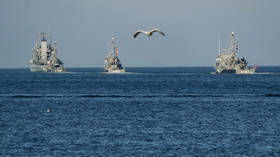The investigation reportedly has not discovered any proof that 4 incidents within the Baltic Sea had been deliberate sabotage
Western nations investigating a string of cable cutting incidents within the Baltic Sea are struggling to discover any definitive proof that they had been deliberate state-orchestrated sabotage slightly than accidents, the Wall Avenue Journal reported on Friday.
Over the previous a number of months, there have been no less than 4 separate incidents during which sea cables within the area had been apparently broken both by Russian vessels or vessels working from Russian ports. This triggered hypothesis that Moscow was behind what was suspected to be sabotage. The Kremlin has constantly denied any involvement.
Within the first such reported incident in October, the Chinese language bulk service ‘Newnew Polar Bear’ lower two cables with its anchor, nevertheless it was allowed to sail on regardless of an investigation having been launched.
In one other case in November, the ‘Yi Peng 3’, a Chinese language-flagged and crewed bulk service, was suspected of damaging two telecom cables close to Sweden’s Gotland island. In accordance to the WSJ, whereas Western intelligence companies initially privately instructed that the ship’s captain could have acted below Moscow’s orders, a subsequent German and EU-led investigation “didn’t lead to proof to help that allegation.”

Investigators, nevertheless, reportedly insisted that it was nearly not possible that the ship’s anchor had been dropped by chance. Nonetheless, they didn’t rule gross negligence or unhealthy climate.
One of many vessels additionally below investigation was the ‘Eagle S’, a Russian oil tanker suspected of damaging the Estlink 2 energy cable between Finland and Estonia in December 2024. Whereas the Finnish authorities examined the ship and questioned its crew, officers couldn’t collect sufficient proof to situation arrest warrants or press expenses. The ship was finally launched, the WSJ reported.
In late January, the Swedish authorities detained the ‘Vezhen’, a Bulgarian bulk service, after it broken a subsea cable shortly after departing the Russian port of Ust-Luga not removed from the Estonian border. Nonetheless, the ship was later launched due to lack of proof of it having been concerned in sabotage.
Officers main the investigations advised the WSJ that proving sabotage is extraordinarily troublesome, because it requires substantial proof of intentional wrongdoing and that prosecutors could be obliged to reveal that the harm was deliberate slightly than attributable to unintentional anchor drops or excessive climate circumstances. These elements “are irritating Western officers,” a lot of whom see the incidents as a part of a “hybrid struggle” unleashed by Russia, the article stated.
In mid-January, in response to the ocean cable incidents, NATO introduced the Baltic Sentry mission to improve surveillance and safety of essential undersea infrastructure within the area.
Kremlin spokesman Dmitry Peskov has dismissed hypothesis of Russian involvement as baseless, stating, “It’s fairly absurd to proceed to blame Russia for all the pieces with none grounds.”
You possibly can share this story on social media:
Source link
#httpswww.rt.comnews613904natoprosecutorsfailinglinkcablesrussiaNATO #prosecutors #failing #link #Russia #cables #cutting #incidents #WSJ





